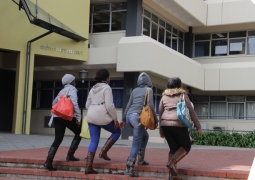
The Chairperson of Parliament’s Portfolio Committee on Higher Education and Training, Ms Cornelia September, has welcomed the increase in the budget allocation of the Department of Higher Education and Training, saying it will lead to improved economic performance.
She was taking part in a debate on the department’s budget vote in a mini-plenary of the National Assembly when she told Members of Parliament that higher education and training was a critical area of investment for the country’s future.
“The increase in the department’s budget must and will mean an improved economic performance in South Africa. It is important to understand the link between education and the economy, and the need to invest in education as part of the drive for inclusive growth and full employment,” Ms September said.
“We welcome the solidarity of other departments to accept reductions in their budget votes and they have done so willingly, understanding the multiplier effect of a worthwhile investment, true patriotism and camaraderie, the youth first.”
She there is much to celebrate in higher education and training, notwithstanding a myriad of challenges, adding that the challenges have been recognised in the National Development Plan (NDP). “This budget that we support as the ANC must be seen in the context of our long-term development as a country, reliant on training, education and a need to be innovative. We need to upskill workers on an ongoing basis.”
Higher Education and Training Minister Ms Naledi Pandor announced an R89.9 billion budget for the department with the following major components: university transfers R38. 6 billion; NSFAS R20.5 billion; skills development R16 billion; technical and vocational education and training colleges R10.7 billon and community education and training colleges R2.3 billion.
“The 2018 budget marks the beginning of a new dawn for post-school education and training. It’s a decisive response to calls for free higher education. Through this funding we signal that universities and colleges are expected to make a radical contribution to South Africa’s development,” Ms Pandor said.
The Minister also said she believed that the country will meet the NDP’s target of 30 000 newly qualified artisans per year by 2030. She said the department has released the National Artisan Development Strategy for public comment. Its goal is to energise artisan development.
“The consultation process with social partners on the National Skills Development plan is ongoing. Once this is concluded we will propose legislative changes so that the National Skills Development Plan can come into force in April 2020,” the Minister said.
She said the past three years have been characterised by events that will have a fundamental impact on the post-school education and training sector. She mentioned three features that she regarded as a challenge to action for the sector.
These are the #feesmustfall and decolonisation of higher education protests; the continuing urgent imperative for the production of skilled human resources; and to contribute to inclusive economic growth. This means also creating opportunities for enterprise development that can intensify job creation, and produce innovative products and services for domestic and international markets.
“The third feature is the world’s increasing focus on the fourth industrial revolution and its implications for business and education and other sectors. We’re in the age of the pervasive influence of emerging technologies and artificial intelligence, and need responsive skills and development research focus and investment to benefit fully,” Ms Pandor said.
She announced that she will create a multi-stakeholder task team to advise the department in on how to take up opportunities of the fourth industrial revolution.
Democratic Alliance member of the Portfolio Committee Prof Belinda Bozzoli warned that South Africa’s higher education sector may soon become a lost cause and called for urgent change. “We want our higher education system to move rapidly into the 21st century and we know how to make it happen. The ANC doesn’t.
“We believe in modernisation, in academic excellence, in institutional differentiation and in responsible and reliable administration,” she said.
Sakhile Mokoena
18 May 2018

